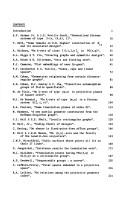| Listing 1 - 10 of 19 | << page >> |
Sort by
|
Book
Year: 1967 Publisher: New York (N.Y.): Friendship press
Abstract | Keywords | Export | Availability | Bookmark
 Loading...
Loading...Choose an application
- Reference Manager
- EndNote
- RefWorks (Direct export to RefWorks)
Book
ISBN: 1634826345 Year: 2015 Publisher: New York : Nova Publishers,
Abstract | Keywords | Export | Availability | Bookmark
 Loading...
Loading...Choose an application
- Reference Manager
- EndNote
- RefWorks (Direct export to RefWorks)
Today, organizational or corporate culture, as it is called by some authors when they talk about commercial organizations, is seen as crucial for the growth and development of modern enterprises. It is believed that organizational culture is one of the basic conditions that forms the base for effective functioning and success of the company. The chapters in this book discuss knowledge management success - subject to the five dimensions of organizational culture (i.e., persistent learning, interpersonal trust, power distance, long-term orientation and team spirit); the sources of power and this
Book
Year: 1926 Publisher: New York : The Macmillan Company,
Abstract | Keywords | Export | Availability | Bookmark
 Loading...
Loading...Choose an application
- Reference Manager
- EndNote
- RefWorks (Direct export to RefWorks)
Given the far-reaching effects of status on human societies, understanding the psychology of social status is crucial. Across all societies, differences in social rank or status not only determine who leads and who follows, but also the ways in which individuals resolve conflicts, allocate goods and resources, and coordinate to achieve shared group goals. The Psychology of Social Status outlines the foundational insights, key advances, and developments that have been made in the field thus far. The goal of this volume is to provide an in-depth exploration of the psychology of human status, by reviewing each of the major lines of theoretical and empirical work that have been conducted in this vein. Organized thematically, the volume covers the following areas: - An overview of several prominent overarching theoretical perspectives that have shaped much of the current research on social status. - Examination of the personality, demographic, situational, emotional, and cultural underpinnings of status attainment, addressing questions about why and how people attain status. - Identification of the intra- and inter-personal benefits and costs of possessing and lacking status. - Emerging research on the biological and bodily manifestation of status attainment - A broad review of available research methods for measuring and experimentally manipulating social status A key component of this volume is its interdisciplinary focus. Research on social status cuts across a variety of academic fields, including psychology, sociology, anthropology, organizational science others; thus the chapter authors are drawn from a similarly wide-range of disciplines. Encompassing the current state of knowledge in a thriving and proliferating field, The Psychology of Social Status is a fascinating and comprehensive resource for researchers, students, policy-makers, and others interested in learning about the complex nature of social status, hierarchy, dominance, and power.

ISBN: 0521423856 0521413257 Year: 1991 Volume: 22 Publisher: Cambridge Cambridge University Press
Abstract | Keywords | Export | Availability | Bookmark
 Loading...
Loading...Choose an application
- Reference Manager
- EndNote
- RefWorks (Direct export to RefWorks)
This book stresses the connection between, and the applications of, design theory to graphs and codes. Beginning with a brief introduction to design theory and the necessary background, the book also provides relevant topics for discussion from the theory of graphs and codes.

ISBN: 0521283787 Year: 1981 Publisher: Cambridge
Abstract | Keywords | Export | Availability | Bookmark
 Loading...
Loading...Choose an application
- Reference Manager
- EndNote
- RefWorks (Direct export to RefWorks)
This 1981 collection of 33 research papers follows from a conference on the interwoven themes of finite Desarguesian spaces and Steiner systems, amongst other topics.
Geometry --- Combinatorial designs and configurations. --- Finite geometries. --- Géométries finies --- Configurations et schémas combinatoires --- Analyse combinatoire --- Geometrie --- Geometrie finie

ISBN: 1316086984 1107368871 1107366658 1107361745 0511623712 1299409032 1107364191 9781107361744 9780511623714 9780521413251 0521413257 0521423856 Year: 1996 Publisher: Cambridge, U.K. : Cambridge University Press,
Abstract | Keywords | Export | Availability | Bookmark
 Loading...
Loading...Choose an application
- Reference Manager
- EndNote
- RefWorks (Direct export to RefWorks)
Although graph theory, design theory, and coding theory had their origins in various areas of applied mathematics, today they are to be found under the umbrella of discrete mathematics. Here the authors have considerably reworked and expanded their earlier successful books on graphs, codes and designs, into an invaluable textbook. They do not seek to consider each of these three topics individually, but rather to stress the many and varied connections between them. The discrete mathematics needed is developed in the text, making this book accessible to any student with a background of undergraduate algebra. Many exercises and useful hints are included througout, and a large number of references are given.
Combinatorial designs and configurations. --- Coding theory. --- Graph theory. --- Graph theory --- Graphs, Theory of --- Theory of graphs --- Combinatorial analysis --- Topology --- Data compression (Telecommunication) --- Digital electronics --- Information theory --- Machine theory --- Signal theory (Telecommunication) --- Computer programming --- Configurations and designs, Combinatorial --- Designs and configurations, Combinatorial --- Extremal problems
Book
Abstract | Keywords | Export | Availability | Bookmark
 Loading...
Loading...Choose an application
- Reference Manager
- EndNote
- RefWorks (Direct export to RefWorks)
Book
Abstract | Keywords | Export | Availability | Bookmark
 Loading...
Loading...Choose an application
- Reference Manager
- EndNote
- RefWorks (Direct export to RefWorks)
Book
ISBN: 1470479540 Year: 2024 Publisher: Providence, RI : American Mathematical Society,
Abstract | Keywords | Export | Availability | Bookmark
 Loading...
Loading...Choose an application
- Reference Manager
- EndNote
- RefWorks (Direct export to RefWorks)
Book
ISBN: 3952107816 Year: 1996 Publisher: [Durham] : University of New Hamphshire,
Abstract | Keywords | Export | Availability | Bookmark
 Loading...
Loading...Choose an application
- Reference Manager
- EndNote
- RefWorks (Direct export to RefWorks)
| Listing 1 - 10 of 19 | << page >> |
Sort by
|

 Search
Search Feedback
Feedback About UniCat
About UniCat  Help
Help News
News